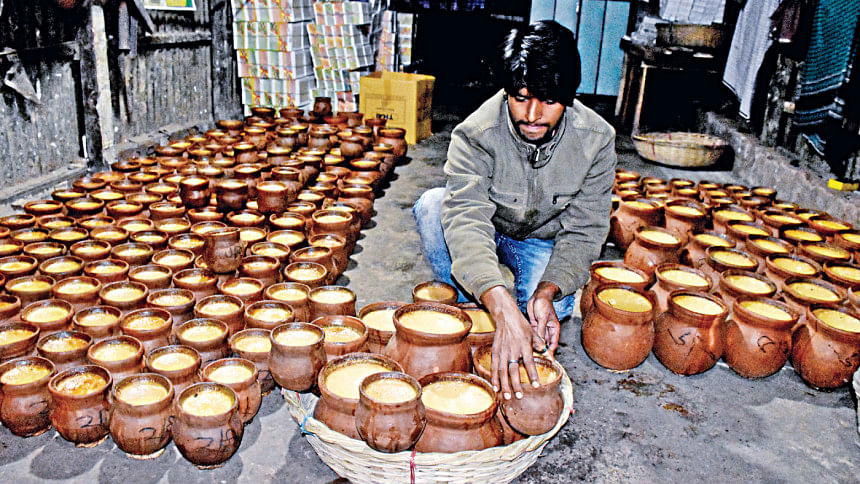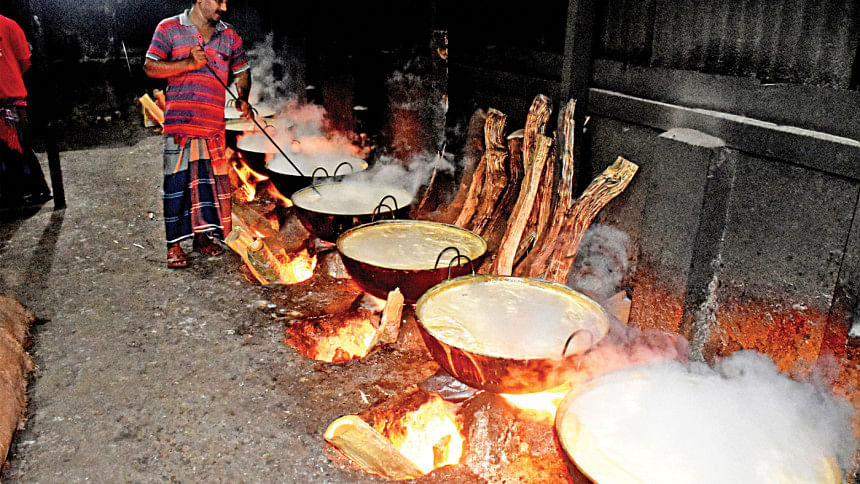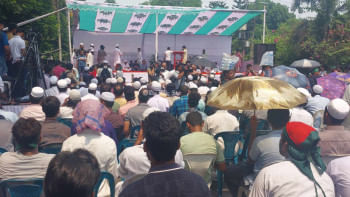Gournadi’s yogurt makers long for taste of pre-pandemic sales

Yogurt producers and traders of a southern upazila made famous for the sweet dairy product are eagerly waiting for better days to come through an end of the ongoing coronavirus pandemic.
"Gournadir Doi", which translates to yogurt of Gournadi, came to prominence on being produced by a wholesale factory set up in a century-old port of this upazila, situated some 30 kilometres away from Barishal district town.
The secret to the recipe is apparently use of milk collected from cows being reared in remote neighbouring char areas.
Local sweetmeat traders said at least four large wholesalers use that pure milk to make yoghurt in the upazila.
Sridam Ghosh, one of the wholesale sweetmeat producer and trader, said his father was one of the pioneers of the Gournadi brand.
Some 55 years ago they used to make the yoghurt in the port but even before that, Ghosh's grandfather used to distribute his product to different areas. According to him, this business has been going on for at least 60-75 years.

About 500 people are involved in this business, which saw production reduced by at least 60 per cent due to the Covid-19 fallout.
Still though, those vested in the business aim to overcome the current crisis and turn things around.
Usually around 200 maunds (one maund equals 37 kilogrammes) of milk ends up generating about 100 maunds of yoghurt. The production doubles during different festivals.
Krishna Ghosh, owner of Loknath Sweetmeat Bhandar, said he makes yoghurt with 30 maunds of milk every day.
However, the ongoing pandemic had forced him to keep the business shut for two months during the nationwide lockdown between March 26 and May 30.
During that period, yoghurt production dropped to 5 maund per day while six out of every 12 workers were laid off.
"Now the yogurt season is ongoing so we hope to sell well in the next few months'" Ghosh added.
Sweetmeat maker Anup Das said he has been in the profession for 35 years.
The milk is usually evaporated to half its volume before the butter is extracted. Afterwards, the liquid is cooled, placed in a clay pot and covered with a sack until yogurt forms in about a day.
Yogurt producer Saikat Das said he buys milk for Tk 40-Tk 50 per kilogramme from local traders in Ramjanpur, Bakchar, Muladi, Barthi and Ramchar areas and sells the yoghurt for Tk 120 per kilogramme.
Palash Ghosh, general secretary of Gournadi Sweetmeat Producers Association, said they supplied yoghurt worth Tk 1.5 to Tk 2 crore to local markets in Barishal, Faridpur and Dhaka every month.
"If the situation continues to improve in the next four months, the workers and traders will survive but if the pandemic worsens, they will collapse again," he added.
Ghosh went on to say that the traditional businesses now faced a liquidity shortage and so would benefit if loans on easy conditions were made available.
Bishu Ghosh, president of Barisal Sweets Producers' Association, said the 500 or so workers involved in the business were trying to get by this winter in hopes of a better future.

 For all latest news, follow The Daily Star's Google News channel.
For all latest news, follow The Daily Star's Google News channel. 



Comments